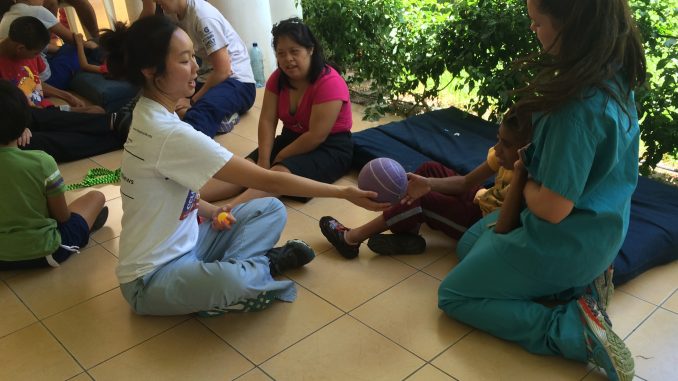
When Carole Tucker is in her office at the Health Sciences campus, Temple University Hospital is just minutes away.
In Guatemala, things are different.
When Tucker volunteered in the Central American country, she saw people go to great lengths just to access a health clinic. She saw a mother climb the hill of her mountain village, carrying her physically disabled teenage daughter on her back, just to find proper medical treatment at a pop-up clinic.
“A lot of times, it’s the only time they see a medical person of any sort for years,” said Tucker, who works as a physical therapist, engineer and professor.
Tucker has traveled to Guatemala with physical therapy professors and students annually since 2014 as a volunteer for Hearts in Motion, an Indiana-based nonprofit that facilitates service trips.
Volunteers help with a variety of issues, from providing dental care to combating malnutrition. While most participating practitioners are American, several Guatemalan physical therapists based in Zacapa — a municipality near the country’s border with Honduras — participate as well.
This upcoming August, the largest group of Temple participants will volunteer with the organization. At least 30 students will embark on the service trip to provide physical therapy, occupational therapy and speech-language pathology services throughout Zacapa.
“From year to year, I still see that there’s a huge need for medical services,” Tucker said.
The still-lingering Zika virus, she added, could cause even more health problems in the country, which spends only 2.6 percent of its gross domestic product on health care — significantly less than the 17.8 percent spent in the United States, according to the U.S. Centers for Medicare & Medicaid Services.
“What struck me the most was really the level of need in public health,” said Zoe Hunter, a speech-language pathologist and adjunct clinical supervisor.
Hunter volunteered with Hearts in Motion for the first time last year.
“This is really an interdisciplinary, international effort this year,” Tucker said.
While Hearts in Motion has two standing clinics in Zacapa, the organization also sets up pop-up clinics for rural Guatemalans who would otherwise lack access to medical care at all. Advertising through local news outlets and word of mouth brings long lines of prospective patients.
“They just come in and they sit so patiently and you’re wondering, ‘Who’s next? Who do I pick?’” Hunter said. “I don’t want to just grab someone when someone else has been sitting three hours.”
“But they know,” Hunter added, explaining the country’s sense of community. “You go out and they all point, ‘She’s next.’”
Despite the volunteers’ medical skills, the group still faces obstacles during the trips.
Hunter remembers a 2-year-old child afflicted with a tapeworm. The government’s supply of medication had run out, leaving the girl uncured, lethargic and severely underweight at 16 pounds.
Another patient living with severe cerebral palsy lacked the ability to speak. When given a picture book, however, the boy quickly learned to communicate by pointing to images.
“If he were in this country, he would be in the special [education] classroom, he would have specialized wheelchair equipment. … He would have every privilege and likely go to college,” Hunter said. “But in Guatemala, you know, he’s never been to school.”
Speech pathologists urge patients with disabilities to communicate through exercises, sometimes using tools like mirrors. While she assigned an exercise to one patient, Hunter learned that their family’s home lacked mirrors and windows.
In 2017, the CIA World Factbook estimated more than 50 percent of Guatemala’s population lives below the poverty line, with 23 percent living in extreme poverty.
“We treated on dirt floors,” said Julie Skrzat, a physical therapist who will earn her Ph.D. in movement science from Temple this year. “And we just embraced it.”
Tucker, who plans to return to Guatemala in August with Hunter and Skrzat, said the patients aren’t the only ones who benefit.
“We learn a lot from them because we look at what it’s like to live with some adversities that we’ve never thought of,” Tucker said. “They’re always really appreciative of what we do.”
Remembering her time in Guatemala, Tucker spoke of poverty: old plumbing pipes, a desolate job market, the surge in undocumented minors who crossed the border between the United States and Mexico. But she also remembered cultural wealth — spicy picamas sauce, basilicas and rich Mayan history.
“I think that something that we as Americans don’t often appreciate is that they are proud to be Guatemalan, they are proud of their culture,” she added. “They’re not looking for us to feel sorry for them. They’re very resilient, they’re really resilient in the light of what we would consider adversity.”
Angela Gervasi can be reached at angela.gervasi@temple.edu or on Twitter @AngGervasi.


Be the first to comment